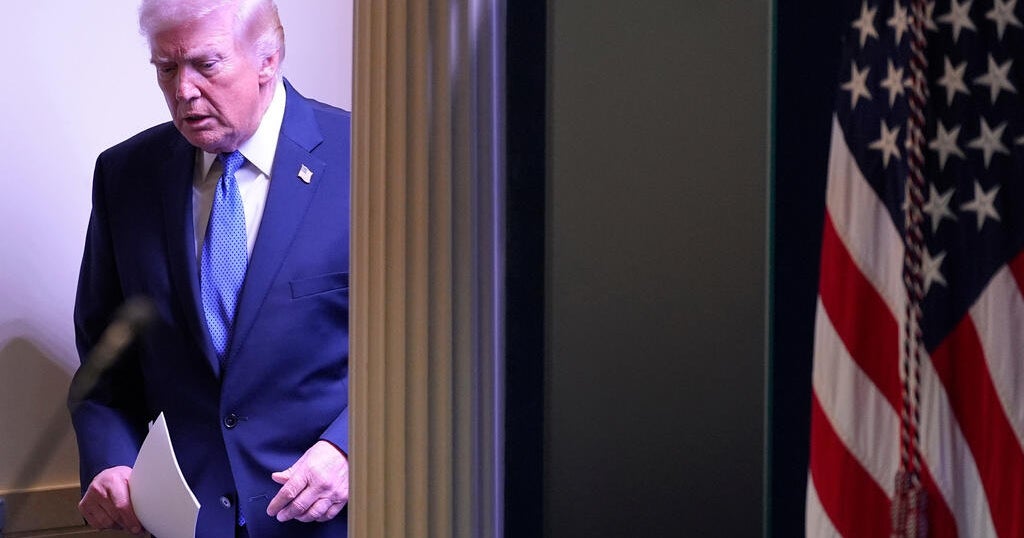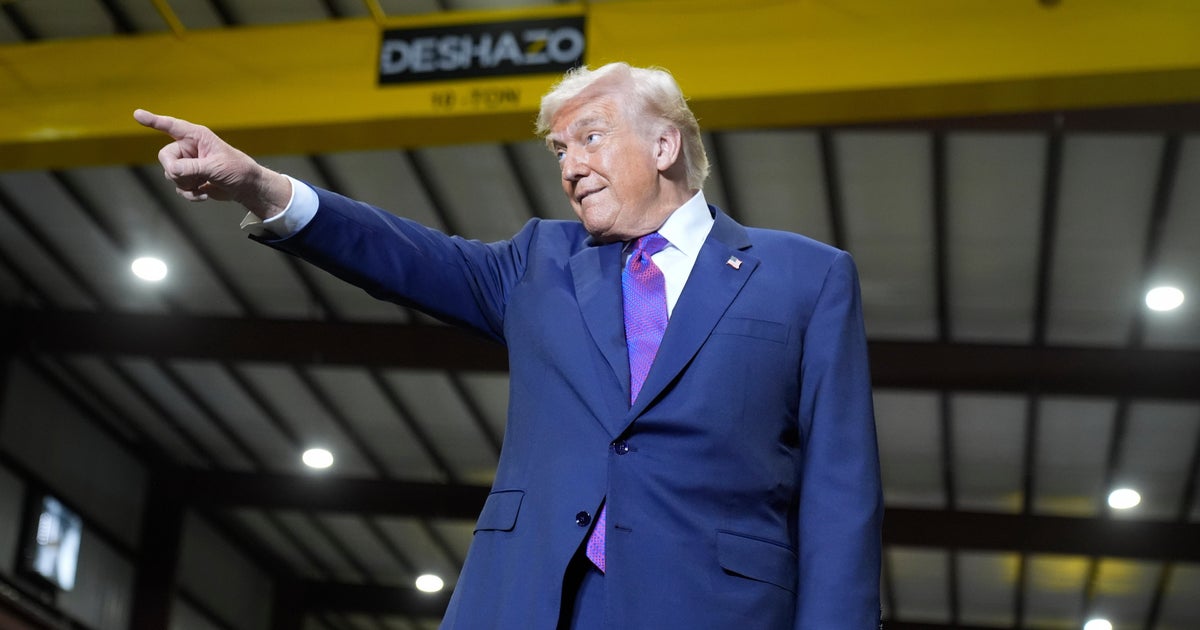Court arguments on keeping Trump off ballot in Colorado begin
A hearing on the use of the Constitution's "insurrection" clause to bar former President Trump from running for president again is underway in Colorado, and oral arguments before the Minnesota Supreme Court in a similar case are scheduled for Thursday.
In Colorado, the judge rejected a motion by Trump's lawyers that she step aside because she once contributed money to a liberal group.
The cases both invoke what's known as the disqualification clause, Section 3 of the 14th Amendment, and the provision has now been cited in the two lawsuits brought by voters in Colorado and Minnesota who argue Trump is constitutionally ineligible to hold federal office because of his actions surrounding the Jan. 6, 2021, assault on the U.S. Capitol.
The suits aimed at the former president set up what are sure to be closely watched legal battles that will test the reach and force of a constitutional provision enacted in the wake of the Civil War, and the outcomes could upend the Republican primary if Trump, currently the leading candidate for the GOP nomination, is found to be ineligible to seek the White House for a third time.
Section 3 of the 14th Amendment states:
No person shall be a Senator or Representative in Congress, or elector of President and Vice-President, or hold any office, civil or military, under the United States, or under any State, who, having previously taken an oath, as a member of Congress, or as an officer of the United States, or as a member of any State legislature, or as an executive or judicial officer of any State, to support the Constitution of the United States, shall have engaged in insurrection or rebellion against the same, or given aid or comfort to the enemies thereof. But Congress may by a vote of two-thirds of each House, remove such disability.
"We've had hearings with presidential candidates debating their eligibility before — Barack Obama, Ted Cruz, John McCain," said Derek T. Muller, a Notre Dame law professor, listing candidates challenged on whether they met the constitutional requirement of being a "natural born citizen." But these cases, Muller added, are different from using an obscure clause of the Constitution with the "incendiary" bar against insurrection.
Even if they're long shots, Muller said, they have a plausible legal path to success and raise important issues.
"Those legal questions are very heavy ones," Muller said.
Dozens of cases citing Section 3 of the 14th Amendment have been filed in recent months, but the ones in Colorado and Minnesota seem the most important, according to legal experts, because they were filed by two liberal groups with significant legal resources. They also targeted states with clear, swift processes for challenges to candidates' ballot qualifications.
The plaintiffs in the cases argue the issue is simple: Trump's efforts to overturn his 2020 election loss, leading to the Jan. 6, 2021, attack on the U.S. Capitol, disqualify him from the presidency just as clearly as if he were not a natural-born citizen, another constitutional prerequisite for the office.
"Four years after taking an oath to 'preserve, protect and defend' the Constitution as President of the United States ... Trump tried to overthrow the results of the 2020 election, leading to a violent insurrection at the United States Capitol to stop the lawful transfer of power to his successor," the Colorado lawsuit alleges, filed on behalf of Republican and unaffiliated voters by the liberal group Citizens for Responsibility and Ethics in Washington.
"By instigating this unprecedented assault on the American constitutional order, Trump violated his oath and disqualified himself under the Fourteenth Amendment from holding public office, including the Office of the President."
Trump has derided the lawsuits as "election interference." His lawyers contend that none of the issues are simple in a provision of the Constitution that hasn't been used in 150 years.
"This is a legal Hail Mary by the Democrats," said Mike Davis, an attorney who appeared with representatives of the Trump campaign outside court Monday in Denver before the Colorado trial began. "This case is going to fail."
Trump's campaign said it had filed a motion for the judge in the case, Sarah B. Wallace, to recuse herself because she had made a $100 donation to the liberal group Colorado Turnout Project in October 2022.
She was appointed to the bench in August of that year by Gov. Jared Polis, a Democrat. Wallace denied the motion, saying she didn't recall the donation until the motion was filed and has no preconceptions about the legal issues in the case.
"I will not allow this legal proceeding to turn into a circus," she said as the hearing began.
The clause in the 14th Amendment has only been used a handful of times since immediately after the Civil War. Trump's lawyers contend that it was never meant to apply to the office of president, which is not mentioned in the text, unlike "Senator or Representative in Congress" and "elector of President and Vice President."
The provision allows Congress to grant amnesty — as was done in 1872 to allow former confederates back into government — which has led some to argue that it has no power without an enabling act of Congress.
Finally, Trump's lawyers contend the former president never "engaged in insurrection" and was simply exercising his free speech rights to warn about election results he did not believe were legitimate.
"Trump's comments did not come close to 'incitement,' let alone 'engagement' in an insurrection," his attorneys wrote in a filing in the Colorado case, adding examples of cases where the congressional authors of Section Three declined to use it against people who only rhetorically backed the confederacy.
The arguments in Colorado could feature testimony from witnesses to the Jan. 6 attack or other important events during Trump's efforts to overturn the election. The identities of witnesses have been shielded until they take the stand, part of the court's effort to limit the heated rhetoric and threats that have become an issue in Trump's criminal trials.
The lawyers are expected to delve deeply into the history of the drafting of the provision in the 14th Amendment and its use between its adoption in 1868 and the amnesty law in 1872. There is scant legal precedent on the issue — so little that the attorneys have had to argue about the meaning of an 1869 case written by Salmon Chase, who was then chief justice of the U.S. Supreme Court but wrote only as an appeals judge.
After the amnesty act in 1872, legal scholars could only find one other time the provision was cited, when Congress refused to seat a socialist member of the House of Representatives because he opposed entry into World War I.
Then last year, it was used by CREW to bar the head of "Cowboys for Trump" from a county commission seat in rural New Mexico. A second liberal group, Free Speech For People, filed lawsuits seeking to prevent Republican Reps. Marjorie Taylor-Greene and Madison Cawthorn from running for reelection.
The judge overseeing Greene's case ruled in her favor, while Cawthorn's case became moot after he was defeated in his primary. Free Speech For People filed the case in Minnesota, where challenges to ballot appearances go straight to the state supreme court.
Melissa Quinn contributed to this report.



